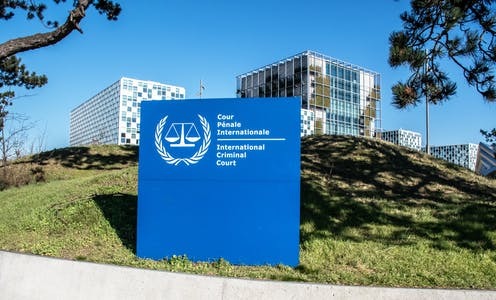The Trump administration has imposed sanctions on four International Criminal Court (ICC) judges after the tribunal issued an arrest warrant for Israeli Prime Minister Benjamin Netanyahu and previously investigated alleged U.S. war crimes in Afghanistan. U.S. Secretary of State Marco Rubio announced sanctions against Judges Solomy Balungi Bossa (Uganda), Luz del Carmen Ibanez Carranza (Peru), Reine Adelaide Sophie Alapini Gansou (Benin), and Beti Hohler (Slovenia), accusing them of targeting the U.S. and Israel through what he called "illegitimate and baseless actions."
The ICC condemned the sanctions, calling them a threat to judicial independence and justice for victims of war crimes. Judges Bossa and Ibanez Carranza supported a 2020 decision allowing investigation into alleged war crimes by U.S. forces in Afghanistan, although the court later shifted focus to Taliban and Afghan government actions.
Judges Alapini Gansou and Hohler authorized arrest warrants in November 2024 for Netanyahu, former Israeli defense chief Yoav Gallant, and Hamas leader Ibrahim Al-Masri over alleged war crimes during the Gaza conflict. The sanctions follow a January U.S. House vote condemning the ICC’s warrant against Netanyahu, reflecting strong Republican support for Israel.
Sanctions block financial transactions with the judges through U.S.-linked banks and dollar systems. However, the Treasury Department issued general licenses permitting a wind-down of existing transactions until July 8, provided funds are transferred to a blocked U.S.-based interest-bearing account.
The move adds pressure on the ICC, which is already facing scrutiny after Chief Prosecutor Karim Khan stepped aside amid a U.N. investigation into alleged misconduct. The U.S. is not an ICC member, along with China, Russia, and Israel. The court continues investigations into war crimes in Gaza, Ukraine, Sudan, and other regions.



 Trump Proposes Two-Year Shutdown of Kennedy Center Amid Ongoing Turmoil
Trump Proposes Two-Year Shutdown of Kennedy Center Amid Ongoing Turmoil  California Sues Trump Administration Over Federal Authority on Sable Offshore Pipelines
California Sues Trump Administration Over Federal Authority on Sable Offshore Pipelines  Faith Leaders Arrested on Capitol Hill During Protest Against Trump Immigration Policies and ICE Funding
Faith Leaders Arrested on Capitol Hill During Protest Against Trump Immigration Policies and ICE Funding  Trump to Announce New Federal Reserve Chair Pick as Powell Replacement Looms
Trump to Announce New Federal Reserve Chair Pick as Powell Replacement Looms  Trump Endorses Japan’s Sanae Takaichi Ahead of Crucial Election Amid Market and China Tensions
Trump Endorses Japan’s Sanae Takaichi Ahead of Crucial Election Amid Market and China Tensions  Panama Supreme Court Voids Hong Kong Firm’s Panama Canal Port Contracts Over Constitutional Violations
Panama Supreme Court Voids Hong Kong Firm’s Panama Canal Port Contracts Over Constitutional Violations  Norway Opens Corruption Probe Into Former PM and Nobel Committee Chair Thorbjoern Jagland Over Epstein Links
Norway Opens Corruption Probe Into Former PM and Nobel Committee Chair Thorbjoern Jagland Over Epstein Links  Federal Judge Signals Possible Dismissal of xAI Lawsuit Against OpenAI
Federal Judge Signals Possible Dismissal of xAI Lawsuit Against OpenAI  Trump Extends AGOA Trade Program for Africa Through 2026, Supporting Jobs and U.S.-Africa Trade
Trump Extends AGOA Trade Program for Africa Through 2026, Supporting Jobs and U.S.-Africa Trade  Newly Released DOJ Epstein Files Expose High-Profile Connections Across Politics and Business
Newly Released DOJ Epstein Files Expose High-Profile Connections Across Politics and Business  Supreme Court Signals Doubts Over Trump’s Bid to Fire Fed Governor Lisa Cook
Supreme Court Signals Doubts Over Trump’s Bid to Fire Fed Governor Lisa Cook  U.S. Lawmakers to Review Unredacted Jeffrey Epstein DOJ Files Starting Monday
U.S. Lawmakers to Review Unredacted Jeffrey Epstein DOJ Files Starting Monday  U.S. Justice Department Removes DHS Lawyer After Blunt Remarks in Minnesota Immigration Court
U.S. Justice Department Removes DHS Lawyer After Blunt Remarks in Minnesota Immigration Court  US Pushes Ukraine-Russia Peace Talks Before Summer Amid Escalating Attacks
US Pushes Ukraine-Russia Peace Talks Before Summer Amid Escalating Attacks  Panama Supreme Court Voids CK Hutchison Port Concessions, Raising Geopolitical and Trade Concerns
Panama Supreme Court Voids CK Hutchison Port Concessions, Raising Geopolitical and Trade Concerns  Ohio Man Indicted for Alleged Threat Against Vice President JD Vance, Faces Additional Federal Charges
Ohio Man Indicted for Alleged Threat Against Vice President JD Vance, Faces Additional Federal Charges  Google Halts UK YouTube TV Measurement Service After Legal Action
Google Halts UK YouTube TV Measurement Service After Legal Action 































